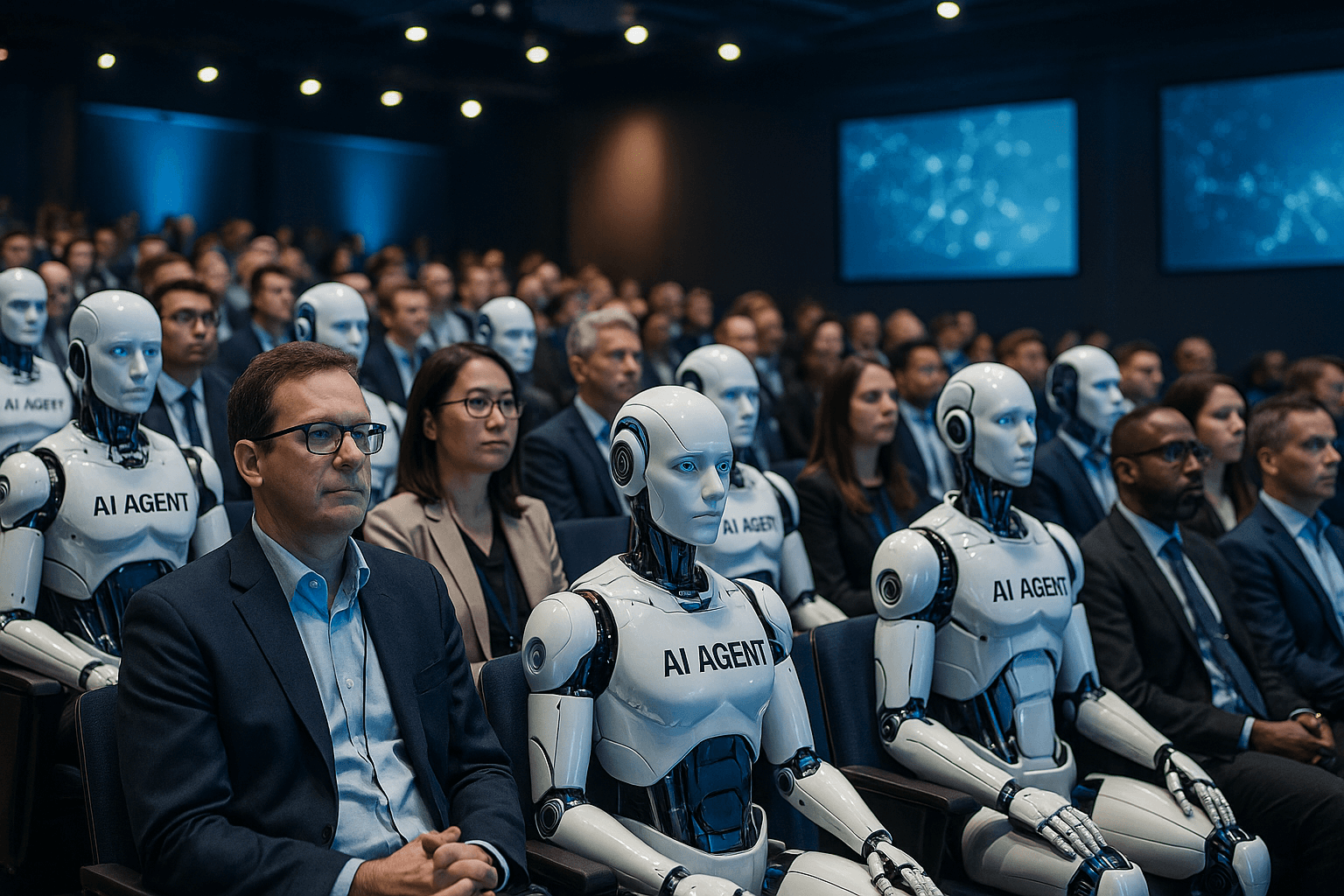By Aidan Wood
On Friday I had the good fortune of making it down to the UK’s inaugural AgentCon and what a blast it was. I could’ve attended three times and had a different experience on each visit; from executive overviews to technical demos and showcases, it was a brilliant expression of the state of Agents and wider adoption of AI in industry. Below, I’ve pulled together some of my main takeaways from the day.
The big question
I wasn’t reading the news (or doing much reading in general) during the dot-com boom/bubble but considering the maturity of online media now, I imagine that the fire-hose of articles about the AI-boom are comparable in volume, amplification, and excess – if not significantly greater. Everyone seems to be asking: can AI really do what people say it does? Is it really going to take jobs? Is it going to take my job? If you read the news, it’s easy to think so; every week there seem to be more stories about jobs in all sectors potentially put at risk by AI.
At AgentCon we were presented with an alternative that most of the room agreed with: if we look at historical precedent, revolutionary technologies tend to increase the number of jobs rather than decrease them. The industrial revolution destroyed some forms of manual labour only to see huge numbers of manufacturing jobs be created. Programming languages intended to abstract development away from developers (COBOL, VBA, even Excel if I’m generous) did the very opposite of their initial marketing claims – instead of there being less developer roles, there were more; with the knock on benefit of developers being more productive and able to build better systems for the world. Dona and Chris (AgentCon’s keynote speakers) presented this positive perspective and reflected that for all of the claims of AI taking jobs which make the news, there are equal news stories where we recognise the potential for AI to empower the existing workforce and give greater opportunity for growth and increased employment.
Personally, I’m unsure where the AI revolution sits in comparison with history. In the short term, I expect macro movement from industry to remove jobs they reckon can be replaced by AI. But in the long term, I think the real winners will be those who adopt AI to empower their existing workforce, letting them build faster, with more clarity, and with passion. It will be these companies who retain an experienced workforce to let them prosper in the future.

The importance of trustworthy AI
Everyone is using AI now – or at least, everyone seems to be talking about how they’re using AI. Between press releases and news articles, it can seem hard to tease out exactly how established organisations are using AI, and the impact they’re seeing on their business. But at AgentCon it was clear: companies using Agentic AI see direct benefits and those who haven’t figured out the best approach are still planning and looking for the right opportunity. This is a consistent message across industry: AI is no longer optional unless you want to be left behind.
However, how we choose to adopt AI, and the specific AI we choose to adopt are questions that aren’t being asked as much as they should be – which is why I found Keegan Chamber’s talk on the importance of Trustworthy AI so relevant.
As organisations around the world adopt AI, it’s critical they consider how that AI impacts the world; how it impacts the people who use it, the people who review it, and the people affected by decisions it makes. Keegan presented trustworthy AI as being reliable, safe, secure, accountable, transparent, inclusive, and fair but above all: designed to have a positive impact on the world. With the current pace of development it’s easy to get swept along with the tide but by thinking about the principles of trustworthy AI we can do our best to make sure the changes we’re making are truly for the better.

Agents have changed development forever
Agent technology has been around for a long time now – our team at Bellrock have been involved in deep research in the area for 30 years – however, LLMs and modern AI have led to an explosive resurgence of the concepts. With these new technologies and the increased availability (and integration) of AI agents, it’s clear to me that Agents have already changed development forever.
We had some great discussions at AgentCon around what specifically separates Agentic workflows from ‘sparkling automation’ (thanks for that brainworm, Dona). As much as I enjoyed the distinction, for most it’s academic: Agents have proven their worth in both ‘manumatic’ and creative tasks across industry, and their impact is going to increase as people take note of what they can do, regardless of the label they’re given. In their recent AI quarterly pulse survey, KPMG highlighted that organisations are now moving away from exploration and towards piloting Agentic AI systems, with 65% of organisations surveyed now doing so.
During various sessions at AgentCon we saw what Agents can do to aid software development. For those who aren’t using it in your workflows, get onboard – it’s like programming with a tailwind. Downhill. On a jet-powered bike. It can help with all areas of the development process: ideation, implementation, testing, reviewing, and documentation. However, as we as an industry progress it’s important we recognise potential pitfalls that come with this increased productivity.

Mainly, we need to ensure we continue to develop our core skills and technical proficiencies as humans. AI can, and does, make mistakes. But as it can produce a sheer mountain of output, it’s hard to review for quality and integrity with architectural intent. Only by ensuring juniors have an opportunity to become well rounded seniors can we ensure companies have the skillset needed to continue their own growth. Opt-in practices like ‘no-AI Fridays’ and peer-to-peer audits of AI generated code are some ideas put forward on Friday.
The big answer
The last two years feel like we’ve seen as much development, change, and innovation in the industry than we have in the prior twenty. Obviously, the fog of time plays a part there but there’s no disputing that we’ve gone through turbulent times and are entering an uncertain future. As we go forward, AI, and in particular Agents, will play more and more of a role in our everyday lives. As developers and users of these systems, it’s on us to make sure we develop and use them correctly.
If you’re interested in any of the points above and have any thoughts, please get in touch.


